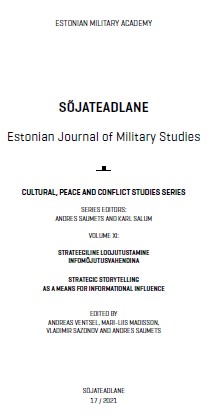VENE TEABEMÕJUTUSTEGEVUSELE VASTAMINE BALTI RIIKIDES: EESTI, LÄTI JA LEEDU LÄHENEMISTE VÕRDLUS
RESPONDING TO THE RUSSIAN INFORMATION CAMPAIGN IN THE BALTIC STATES: A COMPARISON OF APPROACHES ADOPTED BY ESTONIA, LATVIA, AND LITHUANIA
Author(s): Johannes VoltriSubject(s): Media studies, Government/Political systems, Political behavior, Politics and communication, Comparative politics
Published by: Kaitseväe Akadeemia (KVA)
Keywords: information influence; Russia; propaganda; Estonia; Latvia; Lithuania; government office; media; journalism; Hellman; Nothhaft;
Summary/Abstract: In the recent years, numerous studies have been published on information influence activities such as mis- and disinformation or inauthentic behaviour on social media, mainly concerning their prevalence, characteristics, and causes. Yet, comprehensive research on the manner in which governments manage this “information disorder” has remained largely on the sidelines, contributing to a lack of knowledge when it comes to adequate responses to information influence activities. This study seeks to contribute to relevant literature by focusing on the responses of the Baltic States to Russian information influence. The main objective of this article is to examine and compare Estonian, Latvian and Lithuanian governmental responses to Russian information influence activities. In order to obtain a comprehensive understanding on the ways in which the Baltic States have dealt with information influence in general and which countermeasures the three countries have undertaken, focusing on the setup of strategic communication, media literacy in formal education, and media policy, the author of this article analysed the main strategic documents and interviewed state officials. In order to make sense of various strategies that different democracies might opt for, the author used the analytical framework proposed by Hellman and Wagnsson (2017). The research focuses on governmental action, excluding the activities of the media and the third sector, such as independent fact-checking or educational projects. The author argues that although the approach adopted by the Baltic States to counter the Russian information influence is generally quite similar, the three countries have different understandings about the extent to which the state should regulate the media to achieve its goals. Latvia and Lithuania seek to actively shape the media environment, either through supporting the media to encourage media literacy and raise awareness, or by restricting access to Russian television channels to respond to the incitements of hatred. Estonia, on the other hand, decided to develop its own Russian-language public media as an alternative to the Russian information space that is still influential.
Journal: Sõjateadlane
- Issue Year: 2021
- Issue No: 17
- Page Range: 266-299
- Page Count: 34
- Language: Estonian

